UNEP FI’s second Regional Roundtable on Sustainable Finance for 2019 took place in Shanghai last week with more than 280 delegates and 75 speakers.
On 5 and 6 June, the UNEP FI Regional Roundtable for Asia Pacific brought together the sustainable finance community to drive the take up of financing that will help achieve the Sustainable Development Goals, and promote climate change mitigation and adaptation strategies. The Roundtable was co-hosted with Shanghai Lujiazui Financial City Council Green Finance Development Committee (GFDC), in collaboration with Principles for Responsible Investment and co-organised with ChinaSIF. Leaders from across the region, including Mr Kong Wei of Shanghai Lujiazui Financial City Council Green Finance Development Committee (GFDC) and Dr Ma Jun of Green Finance Committee of China Society for Finance and Banking opened the conference, making the case for sustainable finance in China and the Asia Pacific region.
The first plenary panel “At the cutting edge of environmental risk analysis—the Task Force on Climate-related Financial Disclosure & beyond” moderated by UNEP FI’s Remco Fischer put forward the necessity of financial institutions using scientific analytical approaches to climate change disclosure. Lauren Smart from Trucost emphasized the importance of a TCFD-based framework for identifying risks and opportunities and understanding the financial impact of climate change for organisations, whilst ICBC also shared its action plan and experience of environmental information disclosure.
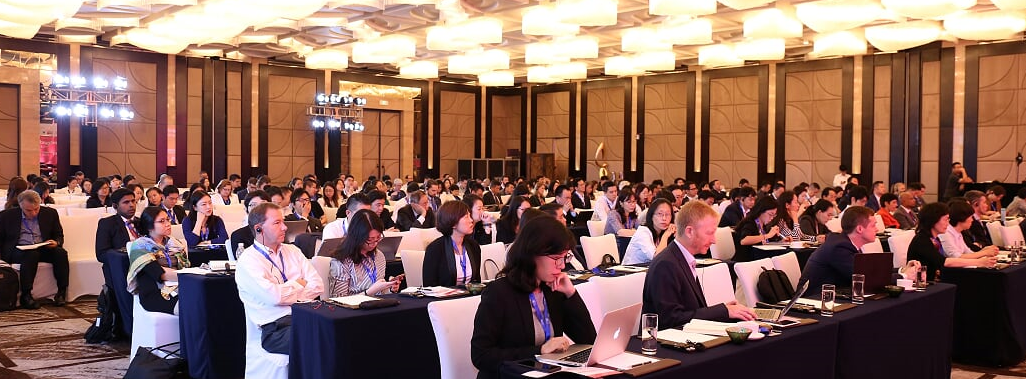
In the next session “Financing the UN Sustainable Development Goals and the Paris Climate Assessment” moderated by UNEP FI’s Careen Abb, the panelists tackled the main challenges of using finance to achieve the SDGs. Liza McDonald from First State Super suggested focusing on both revenue and environmental impact, as well as using indicators to assess the environmental impact during investment activities. Esther An from CDL emphasized the usefulness of the SGD framework in providing consistent information for investors and urged corporations to achieve consistency in the area.
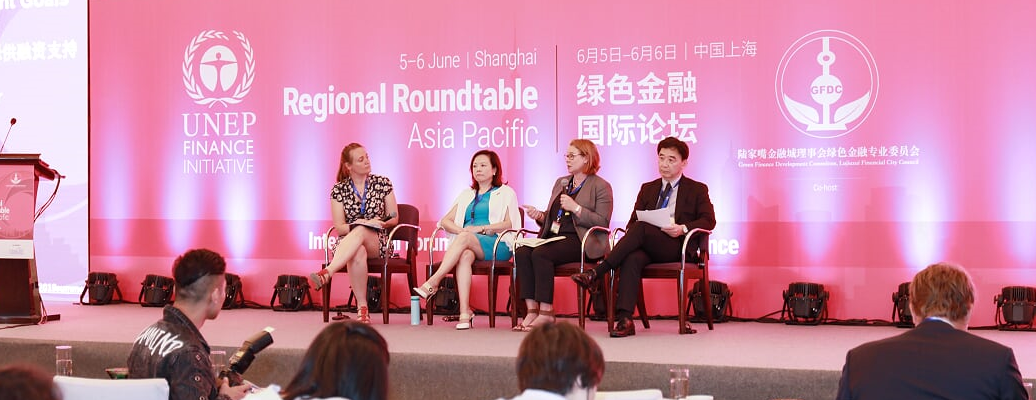
The afternoon of day 1 consisted of 3 parallel streams focusing on banking, insurance and investment, hosted by the PRI.
As part of the agenda designed for banks, Eric Usher, UNEP FI Head, introduced the Principles of Responsible Banking (PRB), the framework that will define the future of sustainability in banking. Four banks, CIMB, Golomt Bank, Shinhan Financial Group and China Industrial Bank joined the discussion and emphasized the importance of the Principles for the region. The following sessions focused on digital innovation in the banking sector and introduced block-chain supported green bonds, the application of Internet of Things in sustainable rubber supply chains, Artificial Intelligence application in Environmental Social and Governance risk assessment and big data application in sustainable agriculture and its financing. Participants concluded that sustainable finance must harness digital technology to respond to the scale and pace of change required to meet the needs of sustainable development.
The following sessions focused on banking sustainability within the ASEAN region, coordinated by WWF and IFC, focusing on the regulatory landscape, sustainable infrastructure and sustainability within the palm oil industry. Infrastructure is often seen as an entry point to promote green investment and the Sustainable Development Goals, while Yuan Liu from International Environmental Cooperation Center suggested that substantive tools and concrete methods play a vital role in the gap of policy formulation and goal realization, using an example called “Rapid screening tool for overseas investment risk” which can present ecological, environmental, and social problems in certain investment areas.
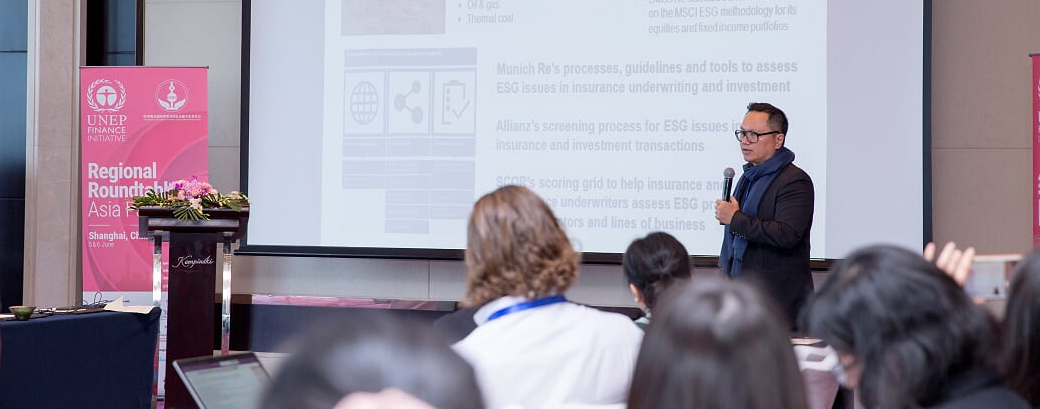
Meanwhile, UNEP FI’s Butch Bacani, who leads the Principles for Sustainable Insurance initiative, hosted the sessions designed for members of the insurance industry. Insurers based in China, Singapore and Australia as well as representatives from the China Green Finance Committee and NGOs covered key sustainability risks and opportunities in China and the wider Asia-Pacific region. Delegates discussed how the insurance industry can effectively advance decarbonisation; as well as how better risk assessment, green insurance solutions and enabling policy and regulatory frameworks can mitigate the effect of natural disasters, ecosystem degradation, environmental pollution, and health risks.
The insurers also covered potential opportunities for the insurance industry such as the Belt and Road Initiative and the Greater Bay Area, implementing the TCFD climate risk disclosure recommendations, the use of insurtech to promote financial inclusion, innovative insurance for ecosystems such as mangroves and coral reefs, investments in low-carbon and resilient infrastructure, and exploring minimum sustainability standards across the region. To deepen sustainability thinking and practice in the Asia-Pacific region, UNEP FI is looking to convene national discussions with insurance industry participants and regulators in Australia and New Zealand later this year, and in China, Japan and Singapore next year.
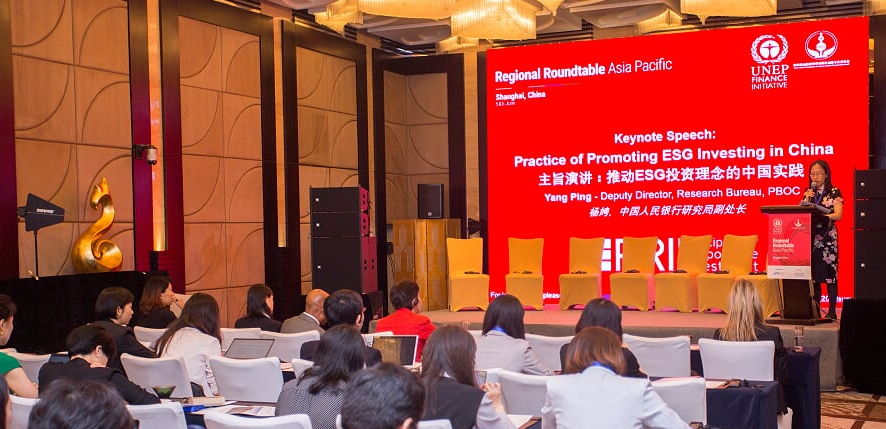
The investment sessions hosted by the Principles for Responsible Investment (PRI) saw a room packed with investors from across the region which covered ESG integration in equities and fixed income investment and tackled ESG disclosure in China. Nan Luo, Head of China at the PRI noted that China is the country with the biggest growth rate of signatories, showing the increasing importance of ESG issues among investors within the region. The delegates heard from six credit ratings agencies in the session titled “ESG in credit risk and ratings”, reflecting the growth in this part of the industry.
The growth of ESG integration was also discussed in the next session, Sau Kwan, President of E Fund Management, stated that ESG investments in China have developed rapidly in the past 3 years, and will be a trend for the future. There was a call for top down support from regulators and associations as well as more education and a change in business? culture.
The final investment session marked the launch of the “ESG Disclosure in China” report. The panel, moderator by Guo Peiyuan, Chairman of Syntao Green finance and China advisor to UNEP FI, explored investors’ needs for ESG disclosure as well as standardisation of ESG data. Investors agreed that sustainability is essential for long-term investors, and ESG disclosure plays a substantial role in it.
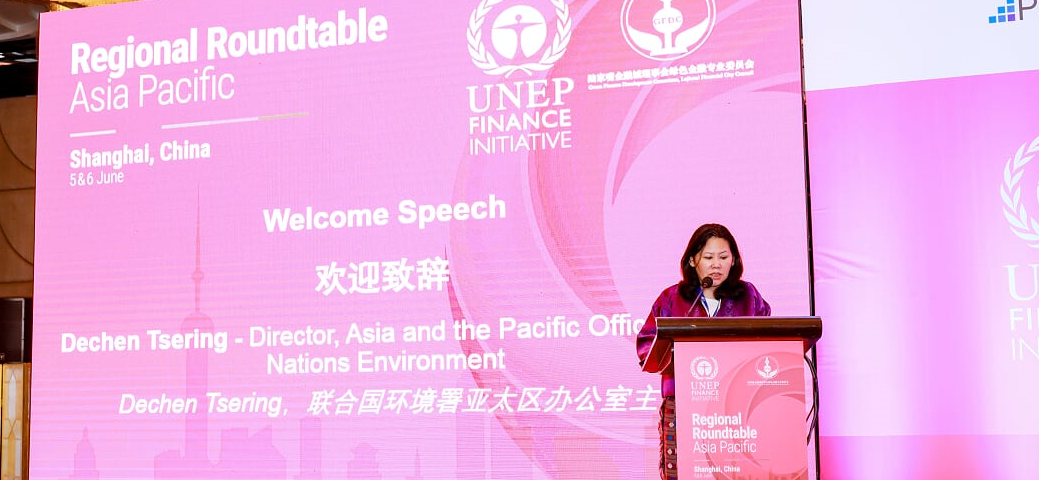
Day 2 was opened by Dechen Tsering, the Director of UN Environment’s Asia Pacific office. Dechen highlighted the role of society at large in combatting air pollution, the theme of World Environment Day 2019 which was hosted by China. This was followed by a panel which brought together high level representatives from investment, insurance and banking, including CG Lai, the CEO of BNP Paribas China, to discuss their views on risks and opportunities around air pollution. The panel agreed that the barriers to financing clean air were lack of standards to measure impact and lack of awareness from SMEs as well as lack of environmental disclosure from businesses. However, the panel believed that tacking air pollution can create tremendous business opportunities, such as energy efficiency financing, green bond issuance and green farming insurance which will in the long run benefit business and enhance competitiveness of financial institutions.
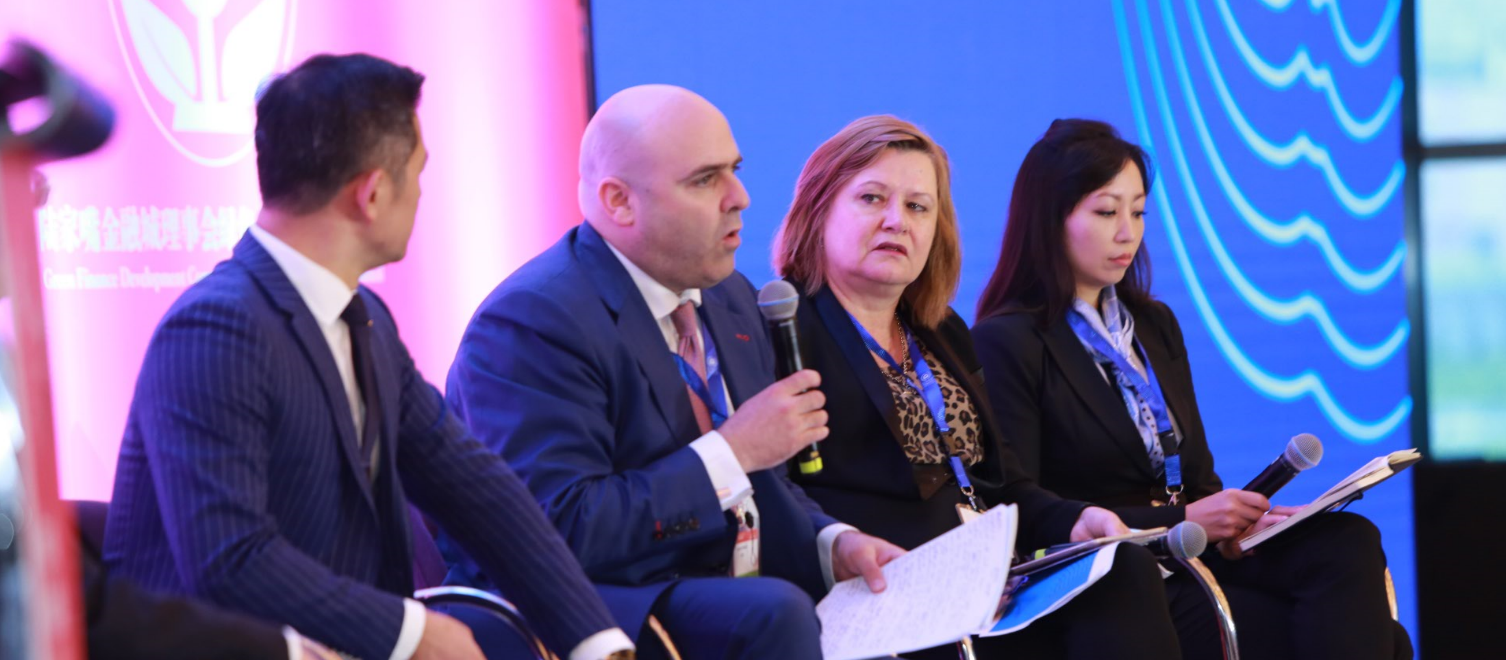
The final panel looked at the Financial Centres for Sustainability (FC4S) Network, a rapidly growing movement of financial centres committed to putting private capital behind green investments. The panel moderated by Mr. Kong Wei, co-host of the Regional Roundtable and the co-chair of FC4S, announced the addition of Beijing and Tokyo to the growing network. The panel emphasised the importance of the network in defining the regional strategy for Asia Pacific and shared their views on the roles of financial centres in promoting green finance. They believed it is important to bring together government agencies and the private sector to develop a comprehensive policy framework for green finance.
UNEP FI would like to thank Mr Kong Wei, Chair of Shanghai Lujiazui Financial City Council Green Finance Development Committee (GFDC) for co-hosting with us, as well as the Principles for Responsible Investment and ChinaSIF. We would also like to thank BNP Paribas, the UK-China Pact, Trucost and RepRisk for sponsoring the Roundtable as well as CFA Institute, IFC and WWF Singapore for partnering with us. This event was made carbon neutral thanks to UNEP FI’s partnership with EcoAct. You can view photos from the event here.
To view agenda and speakers, click here.


